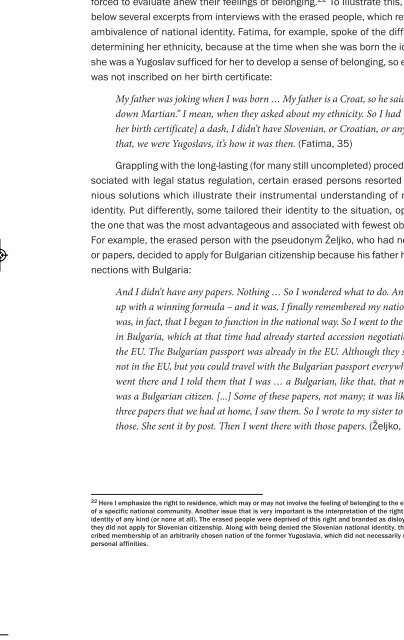The Scars of the Erasure_web
The Scars of the Erasure_web
The Scars of the Erasure_web
- No tags were found...
Create successful ePaper yourself
Turn your PDF publications into a flip-book with our unique Google optimized e-Paper software.
<strong>Erasure</strong>_4a 10.1.11 20:29 Page 204204 THE SCARS OF THE ERASUREcompelled to reflect on what it means to be a member <strong>of</strong> a nation. Being designated,against <strong>the</strong>ir will, as non-members <strong>of</strong> <strong>the</strong> Slovenian nation (understoodboth as narod in <strong>the</strong> narrow, ethnic sense <strong>of</strong> <strong>the</strong> word and as nacija, thus citizenshipfrom which <strong>the</strong>y were automatically excluded), <strong>the</strong> erased people wereforced to evaluate anew <strong>the</strong>ir feelings <strong>of</strong> belonging. 22 To illustrate this, we givebelow several excerpts from interviews with <strong>the</strong> erased people, which reveal <strong>the</strong>ambivalence <strong>of</strong> national identity. Fatima, for example, spoke <strong>of</strong> <strong>the</strong> difficulty <strong>of</strong>determining her ethnicity, because at <strong>the</strong> time when she was born <strong>the</strong> idea thatshe was a Yugoslav sufficed for her to develop a sense <strong>of</strong> belonging, so ethnicitywas not inscribed on her birth certificate:My fa<strong>the</strong>r was joking when I was born … My fa<strong>the</strong>r is a Croat, so he said, “Writedown Martian.” I mean, when <strong>the</strong>y asked about my ethnicity. So I had <strong>the</strong>re [inher birth certificate] a dash, I didn’t have Slovenian, or Croatian, or any … Likethat, we were Yugoslavs, it’s how it was <strong>the</strong>n. (Fatima, 35)Grappling with <strong>the</strong> long-lasting (for many still uncompleted) procedures associatedwith legal status regulation, certain erased persons resorted to inge -nious solutions which illustrate <strong>the</strong>ir instrumental understanding <strong>of</strong> nationalidentity. Put differently, some tailored <strong>the</strong>ir identity to <strong>the</strong> situation, opting for<strong>the</strong> one that was <strong>the</strong> most advantageous and associated with fewest obstacles.For example, <strong>the</strong> erased person with <strong>the</strong> pseudonym Željko, who had no statusor papers, decided to apply for Bulgarian citizenship because his fa<strong>the</strong>r had connectionswith Bulgaria:And I didn’t have any papers. Nothing … So I wondered what to do. And I cameup with a winning formula – and it was, I finally remembered my nation, and itwas, in fact, that I began to function in <strong>the</strong> national way. So I went to <strong>the</strong> embassyin Bulgaria, which at that time had already started accession negotiations with<strong>the</strong> EU. <strong>The</strong> Bulgarian passport was already in <strong>the</strong> EU. Although <strong>the</strong>y still werenot in <strong>the</strong> EU, but you could travel with <strong>the</strong> Bulgarian passport everywhere. So Iwent <strong>the</strong>re and I told <strong>the</strong>m that I was … a Bulgarian, like that, that my fa<strong>the</strong>rwas a Bulgarian citizen. [...] Some <strong>of</strong> <strong>the</strong>se papers, not many; it was like two orthree papers that we had at home, I saw <strong>the</strong>m. So I wrote to my sister to send methose. She sent it by post. <strong>The</strong>n I went <strong>the</strong>re with those papers. (Željko, 49)22 Here I emphasize <strong>the</strong> right to residence, which may or may not involve <strong>the</strong> feeling <strong>of</strong> belonging to <strong>the</strong> environment<strong>of</strong> a specific national community. Ano<strong>the</strong>r issue that is very important is <strong>the</strong> interpretation <strong>of</strong> <strong>the</strong> right to nationalidentity <strong>of</strong> any kind (or none at all). <strong>The</strong> erased people were deprived <strong>of</strong> this right and branded as disloyal because<strong>the</strong>y did not apply for Slovenian citizenship. Along with being denied <strong>the</strong> Slovenian national identity, <strong>the</strong>y were ascribedmembership <strong>of</strong> an arbitrarily chosen nation <strong>of</strong> <strong>the</strong> former Yugoslavia, which did not necessarily match <strong>the</strong>irpersonal affinities.


